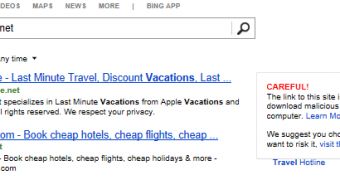A malware analysis rolled out by AV-TEST a few days ago has revealed that Microsoft's Bing search delivers five times more malware-hosting links than Google, despite the company's efforts to improve the security of its search engine.
The Redmond-based tech giant has decided to fight back, explaining that AV-TEST's study doesn't represent the true experience because Bing actually clearly marks the results that might be infected.
“AV-TEST didn’t actually do any searching on bing.com. Rather they used a Bing API to execute a number of queries and downloaded the result to their system for further analysis. By using the API instead of the user interface, AV-TEST bypassed our warning system designed to keep customers from being harmed by malware. Bing actually does prevent customers from clicking on malware infected sites by disabling the link on the results page and showing the below message to stop people from going to the site,” Microsoft explained.
Microsoft has worked out a more complex system that basically doesn't require the company to manually remove links infected with malware from the results page.
Many are hacked pages, the tech giant said, so in case there's something wrong with a specific website, it would naturally be removed from the main results page because nobody would click on it, it added.
But the question still remains: is Bing actually delivering more malware than Google? Microsoft says it doesn't, but it also admits that it's hard to decide which one is better.
“We show results with warnings for about 0.04% of all searches, meaning about 1 in 2,500 search result pages will have a result with a malware warning on it. Of those, only a small proportion of malicious links ever get clicked and the warning therefore triggered, so a user will see the warning only 1 in every 10,000 searches. In any case, the overall scale of the problem is very small,” it continued.

 14 DAY TRIAL //
14 DAY TRIAL //